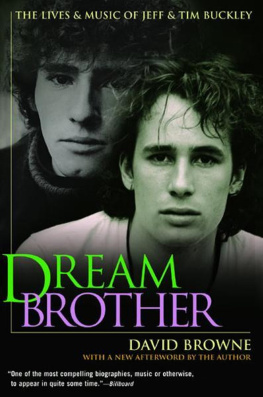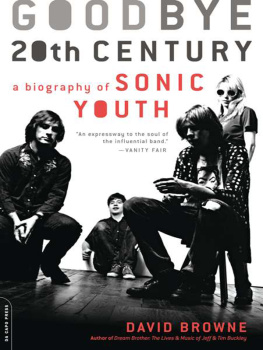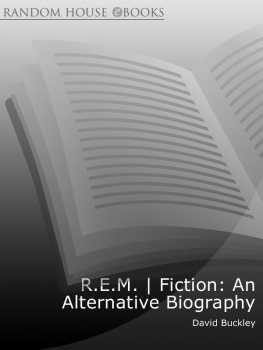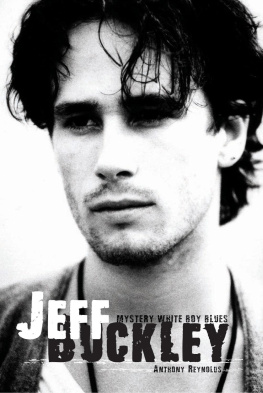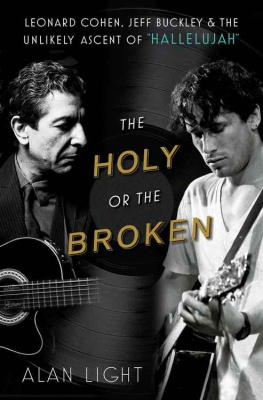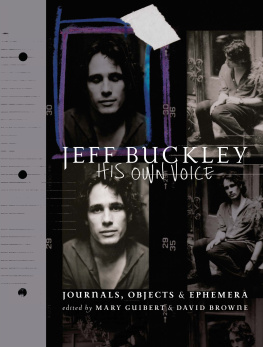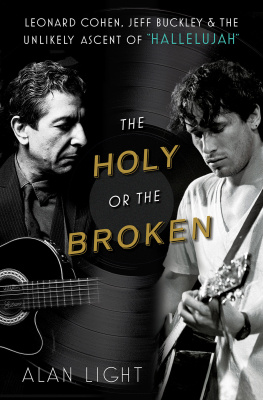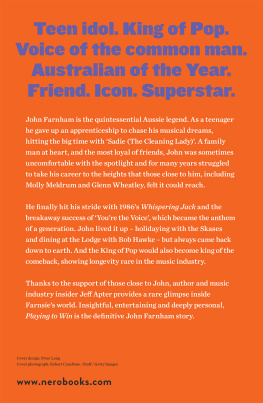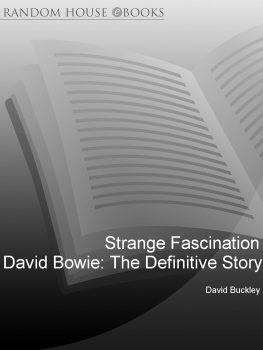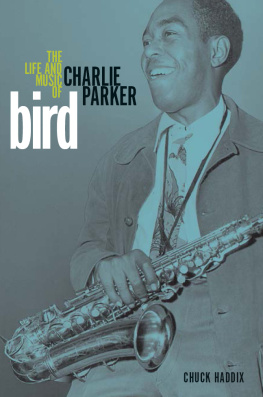T his guy is a book, one of Jeff Buckleys friends told me in the summer of 1993. Start taking notes.
In fact, I already was. Throughout the preceding year, several associates whose music tastes I respected had been urging me to venture to a coffeehouse on the Lower East Side called Sin- in order to see an embryonic talent named Jeff Buckley. They all cited the same reasons for their enthusiasm: He had an astonishing voice with an impressive range, he could seemingly sing anything, and he was a rising star, having signed a contract with Columbia Records. That he was the son of Tim Buckley, a 60s cult figure with whose work I was familiar, made less of a mark on me than did the startling realization that the children of 60s musicians were now old enough to begin their own careers.
On an August evening so stiflingly humid that pea soup would be humbled, a friend and I finally made our way to Sin-. As we walked down St. Marks Place, I could already see a crunch of people spilling out onto the sidewalk in front of what I first thought was an art gallery or clothing store. But noit was Sin- itself, and unable to wedge ourselves into the tiny club, we were forced to catch the performance outside and on our tiptoes. I could only glimpse the top of the performers head and the pegs on the headstock of his guitar. But I heard the voice and heard the songs, and it was obvious something important was happening. Soon after, I was assigned to report on this phenomenon for the New York Times, and one day in the middle of September I dialed Jeff Buckleys home number to set up an interview.
At first he was hesitant, asking me what section of the Times the article would appear in. (When I told him it would be for the newly launched Styles of the Times, he scoffed, But nobody reads that!) Given his age (twenty-six) and his affiliation with a conglomerate, his wariness toward the media and its coverage struck me as curious. I suggested we first meet informally at a local bistro before we did a proper interview. He agreedand then didnt show up. (As I later learned, this was far from the only time he had missed a meeting during the course of his career.) He apologized when I called him back, and we rescheduled for the following morning. This time, he appeared on schedule, wearing jeans and a long-sleeved red T-shirt and sporting a summer-short buzzcut. We ordered breakfasts and began chatting about music and the angle of the interview. Can I ask you one question? he inquired at the outset. Is this going to be about my father? Because I never knew him.
Unaware of the relationship between father and son, and more interested in son than father anyway, I assured him the article was a profile of him and his seemingly blossoming career. That out of the way, he began to talkabout his background, his life, his musical tastes, our mutual knowledge of the music of Nusrat Fateh Ali Khan. Eventually I asked if I could take notes, and he nodded and gestured toward my pad for me to begin. For the next hour and a half, we talked in what amounted to his first major press interview.
It was a fascinating but somewhat bewildering conversation. As he spoke of his life, his future, and the upcoming recording sessions for his first album, his mood veered from self-assured to glum, his tone from ethereal to wisecracking. I had already learned that his contract with Columbia was an enviable one, and yet this seeming novice to the business came across as skeptical and distrustful of it all. Just when he seemed easy to understand, he slipped off into another, completely different disposition. (Looks like he could be wounded, I scribbled in my pad.) It was apparent that this was one of the most enigmatic performers I had ever spent time with, and when we had to leave and he shuffled out with a haunted, wounded-deer look in his eyes, I knew what his friend had meant: Maybe there wasnt a book about him at this point, but there certainly was a story in there somewhere.
Nearly four years laterthe late morning of May 30, 1997I was in my office at Entertainment Weekly magazine when a beep announced the arrival of E-mail. It came from a coworker, and the subject header simply read Jeff Buckley. My first thought was that there was finally a release date for that overdue second album we had been hearing about, or perhaps it was an announcement that he would be performing in the area. Instead, it was a terse, two-sentence note: A report on the Internet said he was missing somewhere in Tennessee, near the Mississippi River.
It was shocking and depressing news; his astonishing first album, Grace, had become a best friend and comfort to me during the last few years. That weekend, while everyone waited to see whether he would turn up in the waters of the Wolf River in Memphis, I began work on an obituary, and our meeting in 1993and his friends words about a bookhung in the air. From what I knew about Jeff Buckleys life based on our initial conversation and from reading the interviews he did to promote Grace, I now realized there was a book in there somewhere. It was a poignant, sprawling story about a kid who grew up the son of a semi-famous 60s rock star who had died young, a child who strove to become his own personand then, in what seemed either a horrific twist of fate or just a horrific accident, was now gone himself at an equally young age. That summer and fall, I began my preliminary research, and a book announced itself to me.
It was clear that the life of Tim Buckley, the absentee father Jeff had barely known, would have to be explored to some degree. Jeff resented, even hated, any and all comparisons to his father, and for understandable reasonsTim had left Jeffs mother, Mary Guibert, before Jeff was even born, and like most of us, Jeff yearned to accomplish goals in life that would surpass those of his parents. But it soon became apparent that the intense caution Jeff displayed to me had been with him since childhood and underscored his entire career. And as my research continued, it became vividly clear that Jeff did not know his biological father, and that they were two very different people in many ways, but that Jeff was painfully aware of the mistakes Tim had made in his life and career. But what were those errors? What exactly had happened to Tim Buckley that left him dead at twenty-eight and left his far-off son perpetually on his guard? The Buckley family history, along with that of the Guiberts, would have to be fleshed out as well.
All along, I was well aware that Jeff may have been skeptical of the connection. Then, one evening I was speaking with one of his closest female friends, and I told her how deep and far-ranging my research would have to be. Thats amazing, she said. Jeff wanted to know all that. Its such a shame hes not around, because he could have hired you to be his detective. With such words of support, my journey in search of Jeff Buckley began in earnest.
This book is the result of more than two hundred primary-source interviews conducted between June 1997 and June 2000. The conversations took place in person and by phone and E-mail, and spread from New York City, Jeffs home base, to California (both Los Angeles and Orange County), Memphis, Paris, Arkansas, Mexico, London, and Portland, Oregon. Mary Guibert, Jeffs mother and the executrix of his estate, was the first to offer her time and resources. At the conclusion of our first informal meeting, she told me she would make herself available for interviews, not ask to see the finished manuscript, and encourage others to speak with me. Later she allowed me access to journals, unreleased tapes, even answering-machine messages. For graciously enduring repeated, nagging, and sometimes difficult questions and for opening up her world to a journalistic interloper, I thank her deeply.

